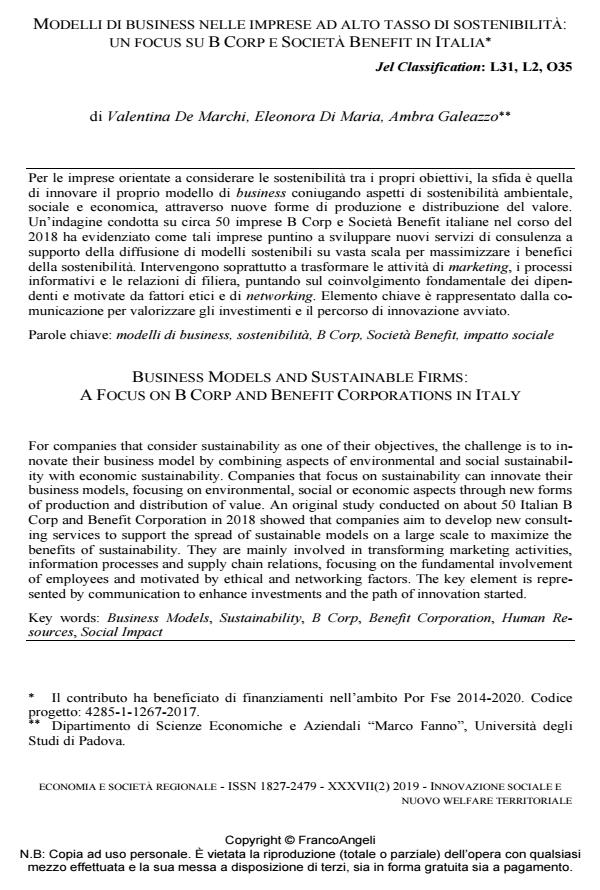Modelli di business nelle imprese ad alto tasso di sostenibilità: un focus su b corp e società benefit in Italia
Titolo Rivista ECONOMIA E SOCIETÀ REGIONALE
Autori/Curatori Valentina De Marchi, Eleonora Di Maria, Ambra Galeazzo
Anno di pubblicazione 2019 Fascicolo 2019/2
Lingua Italiano Numero pagine 11 P. 85-95 Dimensione file 245 KB
DOI 10.3280/ES2019-002008
Il DOI è il codice a barre della proprietà intellettuale: per saperne di più
clicca qui
Qui sotto puoi vedere in anteprima la prima pagina di questo articolo.
Se questo articolo ti interessa, lo puoi acquistare (e scaricare in formato pdf) seguendo le facili indicazioni per acquistare il download credit. Acquista Download Credits per scaricare questo Articolo in formato PDF

FrancoAngeli è membro della Publishers International Linking Association, Inc (PILA)associazione indipendente e non profit per facilitare (attraverso i servizi tecnologici implementati da CrossRef.org) l’accesso degli studiosi ai contenuti digitali nelle pubblicazioni professionali e scientifiche
Per le imprese orientate a considerare le sostenibilità tra i propri obiettivi, la sfida è quella di innovare il proprio modello di business coniugando aspetti di sostenibilità ambientale, sociale e economica, attraverso nuove forme di produzione e distribuzione del valore. Un’indagine condotta su circa 50 imprese B Corp e Società Benefit italiane nel corso del 2018 ha evidenziato come tali imprese puntino a sviluppare nuovi servizi di consulenza a supporto della diffusione di modelli sostenibili su vasta scala per massimizzare i benefici della sostenibilità. Intervengono soprattutto a trasformare le attività di marketing, i processi informativi e le relazioni di filiera, puntando sul coinvolgimento fondamentale dei dipendenti e motivate da fattori etici e di networking. Elemento chiave è rappresentato dalla comunicazione per valorizzare gli investimenti e il percorso di innovazione avviato.
Parole chiave:Modelli di business, sostenibilità, B Corp, Società Benefit, impatto sociale
Valentina De Marchi, Eleonora Di Maria, Ambra Galeazzo, Modelli di business nelle imprese ad alto tasso di sostenibilità: un focus su b corp e società benefit in Italia in "ECONOMIA E SOCIETÀ REGIONALE " 2/2019, pp 85-95, DOI: 10.3280/ES2019-002008